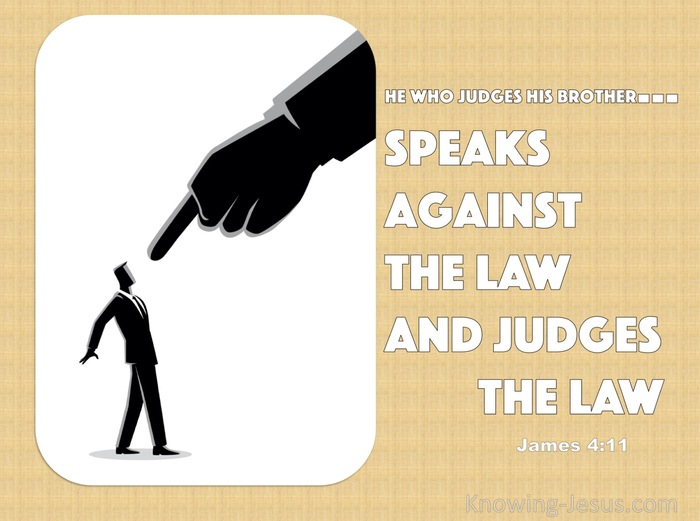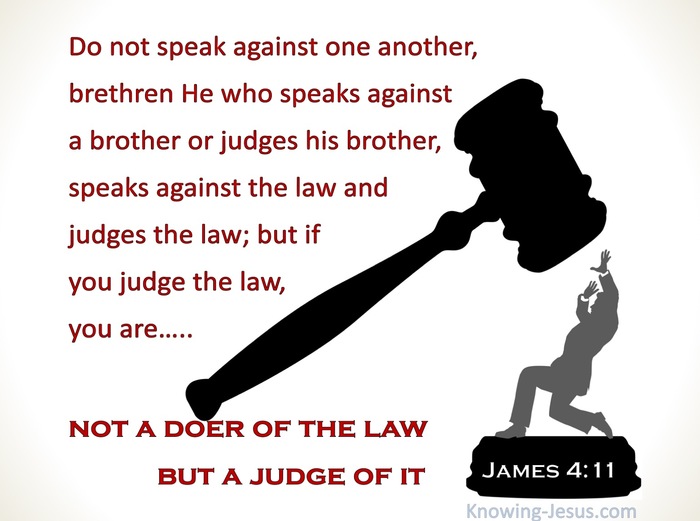◄ What Does James 4:11 Mean? ►
Do not speak against one another, brethren He who speaks against a brother or judges his brother, speaks against the law and judges the law; but if you judge the law, you are not a doer of the law but a judge of it.
James 4:11(NASB)
Verse of the Day
The tongue is a tiny member of the body, but its ungodly use can cause real damage. James lays out the principles and practice of godly speech. He not only warns against 'speaking evil' but explains that 'evil speech' is a sin: "Do not speak against one another," he warns us, "He who speaks against a brother or judges him, speaks against the law. He judges the law. And if you judge the law, you are not a doer of the law but a judge of it."
James wanted to make it clear that as believers, we should do the royal law of God, but not be a judge of it in the lives of others. We are not simply to know the law. The law of God is to be manifested in our lives through godly living. However, pointing a judgemental finger at a fellow believer is counter to the law, for there is ONE Lawgiver and ONE Judge: the Man Christ Jesus.
James explained that speaking against a Christian brother exposes a judgemental attitude that is often manifest in an 'evil' way of speaking that dishonours the Lord. It demonstrates a critical and superior attitude that elevates self above others. It places 'self' in the role of judge, a position of which God alone is worthy. James teaches that disparaging a fellow believer emanates from a spirit of negativity and unlawful condemnation.
It causes the Christian to fall from grace into legalism. It identifies a self-righteous attitude that is conceived in the scornful heart of a carnal Christian who finds fault with others, in order to look good themselves.
We are called to be doers of the Word and not hearers only. We are called to be doers of God's royal law of love and not to become judges of the law. It is not our role to adjudicate the actions of others and criticise them if their behaviour does not line up with our own, personal standards. We are called to judge our own conduct, but not that of others. That responsibility falls to God alone.
We are called to edify and encourage one another. But pointing the finger of blame, over-stating a brother's fault, participating in unfounded gossip, censorious speech, or condemning the legitimate, freewill choices of another Christian when their actions conflict with the freewill standards we have chosen, is considered by James to be evil speech.
It is quite sobering to realise that the spirit behind evil, incorrect speech, is not only a sin because it violates God's written Word, but contravenes every biblical instruction on godly living, for we are not to judge one another: "Judge not," Christ warned us, "that ye be not judged."
We are certainly called to judge the spiritual fruit of pastors and teachers, and check the doctrines they teach against Scripture. We are to be spiritually discerning. We are to beware of false teachers and be able to identify unbiblical teachings and doctrines of demons. However, we are not instructed to judge the thoughts, hearts, motives, and behaviour of others, as it degrades our own testimony and dishonours the Lord Who is the only one worthy to judge the thoughts of the heart and the actions of a man.
It is the royal law of love which calls us to love our neighbour as we love ourselves. It is the command of Christ that we should be applying in our lives: "Love one another as I have loved you." To judge the motives of a fellow believer's actions equates to judging the law. To pass judgement on another believer is to evaluate his heart or to draw a conclusion of his standing before God, which should never be.
Appraising others sets us up as a judge of the law rather than one who adheres to the law. Judging a fellow believer according to one's own standard, implies that we are superior to the law, but only God Who gave us the law holds the right and responsibility to be judge and jury.
James teaches that the tongue is a small member of our body which can be used for good or evil. May we guard our hearts and bridle our tongue with all vigilance, for out of it can flow springs of life or the curses of death. May we be careful not to become judgemental or to speak against one another, for to do so violates God's holy law, speaks against the law and judges the law.
God alone knows the thoughts of a man. Only God understands the motives behind a man's actions and attitude. Only God has the authority to judge righteously. The judging of others does not belong to a Christian, rather it usurps the authority of God, for no one knows the heart of another save God alone.
My Prayer
Heavenly Father, I pray that I may become a doer of Your holy law and not fall into the foolish trap of judging it, by condemning the actions of others. Lord, You alone can judge the thoughts of the heart and I have no right to condemn others, through my own self-righteous attitude. Keep me humble before you and help me become an encouragement to my brothers and sisters in Christ, and not their accuser. Keep me from being 'wise in my own conceit', or making arbitrary assumptions about the motives of others and above all, teach me to love others as Christ loved me, for in so doing I will honour Your name, as Christ lives in and through me. In His precious name I pray, AMEN.
Choose a Verse from James 4
James 4:11 Further Study
- James 4:11 in the Parallel Bible
- James 4:11 in the Thematic Bible
- James 4:11 Cross References
- James 4:11 Treasury of Scripture Knowing
- James 4:11 Sermons
- James 4:11 Prayers
- James 4:11 Images
- Choose Chapter
Never miss a post















